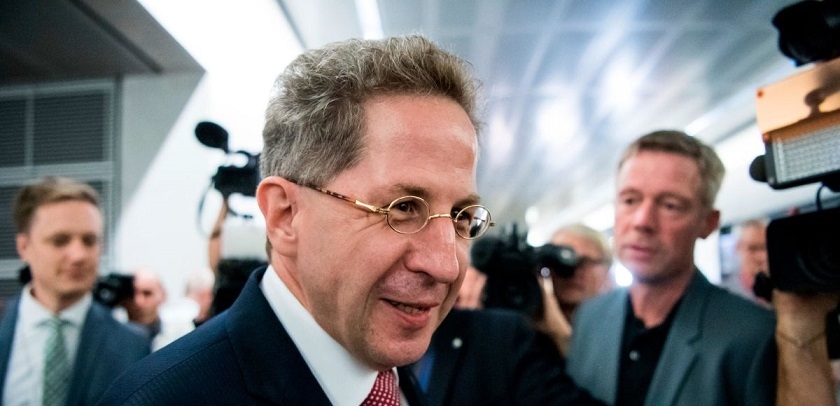German spy chief removed
September 19, 2018 | Expert Insights

Germany's domestic intelligence chief, Hans-Georg Maassen, has been told to quit and move to a senior post at the interior ministry.
Background
A fatal stabbing has led to far-right clashes on the streets in the eastern German city of Chemnitz. It was reported that on Saturday evening, an argument among three men resulted in violence through stabbing. Three people were injured and one had died in the hospital. This story quickly spread online with a particular focus on the nationalities of the men involved. Incidentally, the man who was stabbed to death was a German and the main suspect was Iraqi man. Though these suspects were taken into custody, investigators believe that the stabbing was not done in self-defence.
On Sunday, a call from the far-right activists led to 800 people turning up and ensuing marches, protesters and intimidating people they took to be foreigners by chasing them down the street. On Monday however, many people gathered at the heart of Chemnitz. According to the Police, 6,000 people attended in support of the far-right group Pro Chemnitz, while another 1,500 people protested on the side, including left-wing groups. These protestors threw fireworks, bottles and other projectiles. As a defence, the 600 strong police force stood grounded with two water cannons as a deterrent. Several far-right protesters performed Nazi salutes. Video footage also shows demonstrators attacking police officers. The police also used pepper spray and truncheons to regain control of the situation.
Analysis
German domestic spy chief Hans-Georg Maassen has been forced to step down, to end an explosive row over immigration and the far right that has once more rocked the German chancellor's fragile coalition.
Mr. Maassen will leave the BfV spy service and become a state secretary in the interior ministry. The German media reports that he will actually move to a higher pay grade. It is not yet clear who will replace him. The government decision came amid a row over Mr. Maassen's response to far-right unrest in Chemnitz, eastern Germany. Mr. Maassen said that he doubted that foreign-looking people had been hounded, following which Chancellor Angela Merkel was urged to sack him. Critics said his scepticism downplayed the seriousness of far-right violence and intimidation in Chemnitz.
Several xenophobic assaults were reported in the eastern city after the fatal stabbing of Daniel Hillig. They were described as racist "hunts", and images emerged showing demonstrators chasing people and flinging bottles and fireworks.
Controversially, spy chief Mr. Maassen said his Federal Office for Constitutional Protection (BfV) - which is similar to the British MI5 - had "no reliable information about such hunts taking place" in Chemnitz.
He also questioned whether a video posted by "Antifa Zeckenbiss" - meaning "anti-fascist tick bite" - really showed, as claimed, a "hunt in Chemnitz" on 26th August. Mr. Maassen said the video could have been disinformation; he added that he did not know who was behind Antifa Zeckenbiss.
Tuesday's decision was a compromise between Mrs. Merkel and her coalition partners - Interior Minister Horst Seehofer, of the right-wing Bavarian CSU, and centre-left Social Democrat (SPD) leader Andrea Nahles. SPD leaders -- as well as the opposition Greens, Free Democrats and Linke parties -- had demanded the resignation or sacking of the spy chief for political meddling, and pointed to his repeated meetings with leaders of the anti-immigration Alternative for Germany (AfD) party.
The former intelligence chief has rejected accusations that he had supported AfD lawmakers with early access to unpublished data and advice on how to avoid surveillance by his Federal Office for the Protection of the Constitution (BfV). AfD is now the main opposition party, with 92 seats in the 709-seat Bundestag. It backs the far-right protests, arguing that violent asylum-seekers should be expelled from Germany. It is furious with Mrs. Merkel for having let in more than a million migrants in 2015-2016.
On one level, both major parties, the CDU and SPD, are distrustful partners stuck in a political marriage of convenience after the AfD, a one-time fringe party, poached millions of their voters in last year's elections. Seehofer recently labelled the migration issue "the mother of all problems" in German politics - a comment read by many as a veiled reference to Merkel's nickname "Mutti", or Mummy.
In June, Seehofer brought Merkel's government close to collapse by insisting on Bavaria's right to independently deport rejected asylum-seekers, in breach of EU rules and German national policy. The BfV was created in 1950 by the Allied powers in Germany to guard against communist and pro-Nazi groups. It is part of the federal interior ministry and is overseen by the Bundestag. It’s similar to the FBI in the US.
The BfV cannot make arrests. It says most of its intelligence is gathered from open or public sources, including press reports. It also runs counter-espionage operations, watching foreign spies in Germany. The overseas intelligence-gathering is done by the BND.
Assessment
Our assessment is that the present government is fractious and is a coalition of mistrust where no sides trust the other. We believe that Germany’s main state security body may be soft on far-right extremism. We feel that the row reflects the Chancellor’s weakened position and the elevation of the intelligence chief is a compulsion of the fractured verdict.








Comments